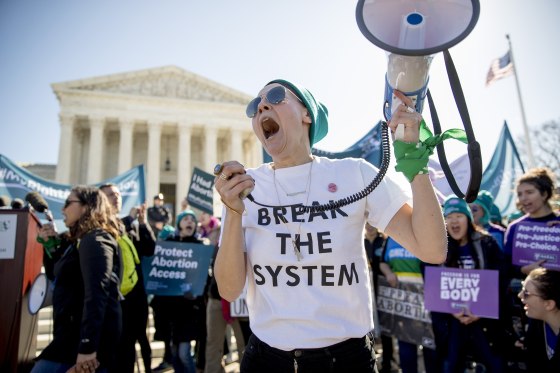On Wednesday, the Supreme Court heard opening arguments for Russo v June Medical Services, LLC, the first major abortion case considered by this conservative-leaning court since the confirmation of Justice Brett Kavanaugh. If the justices decide to uphold a Louisiana law requiring abortion providers to secure hospital admitting privileges in order to care for patients, Roe v. Wade will be effectively gutted and bills creating undue burdens for people seeking abortion care will be the law of the land.
If the justices decide to uphold a Louisiana law requiring abortion providers to secure hospital admitting privileges in order to care for patients, Roe v. Wade will be effectively gutted.
I’ve had an abortion. I was a year out of college, in an unhealthy relationship that didn’t seem overtly toxic until that pregnancy test screamed positive, and was in no way ready, willing, or able to be a parent. Unlike the people who live in 90 percent of the counties who do not have an abortion provider, a local Planned Parenthood was a short five-minute drive (on a bad traffic day) away from the apartment I shared with my then-partner. Unlike pregnant people living in 34 U.S. states, I did not have to sit through a mandatory counseling session before I had my surgical abortion at seven weeks gestation. Unlike people living in 26 states, I did not have to endure a mandatory waiting period — lasting anywhere from 24 hours to three days — before I had a medical procedure that is safer than a wisdom tooth extraction.
I didn’t walk past protesters screaming obscenities or trying to pass off pictures of stillborn babies as aborted fetuses or calling me a murderer in order to receive the legal medical care I have a constitutional right to access. I walked into a health care facility pregnant, I walked out not pregnant, and after resting on my living room couch watching “The Office” for an afternoon, I went on with my life.
Today, I have a lucrative writing career, two children, a healthy seven-year relationship, and a comfortable (read: tiny) apartment in Brooklyn, New York. My abortion wasn’t traumatic and I don’t regret it. In short, my abortion story is mostly mundane — the antithesis of the kind of stories the anti-abortion movement constructs and attempts to capitalize on. I wasn’t conflicted, I wasn’t coerced, and I wasn’t devoured by guilt or depression following my procedure. My abortion was normal, my experience was normal, and that normalcy is what those hoping to destroy the constitutional right to have an abortion have worked so tirelessly to undermine.
Which is why I, along with 10 other people, shared my abortion story with the Supreme Court in an amicus brief filed late last year. I detailed my life as a child in Anchorage, Alaska, where I lived with my mother, my brother, and my devoutly Southern Baptist and physically abusive father. I shared information about my relationship with the man who got me pregnant — a man who didn’t want to be a parent either, but by the grace of his gender was spared the harassment I endured months after my abortion and at the hands of religious, anti-abortion family members and “friends.” Because while my abortion procedure was relatively pain-free, the aftermath was anything but.
I shared private information, both personal and medical, with people who can only be described as strangers, including a newly appointed justice I worked hard to keep off the bench. I cannot think of any other medical procedure that requires so much of the patients who have it. Colonoscopy patients are not sharing stories of their procedures in a desperate attempt to make sure others can receive the same type and level of care, even though a person is 40 times more likely to die from a colonoscopy than they are in an abortion.
In a perfect world, sharing my story with the people who make up the Supreme Court would be entirely unnecessary. In a perfect world, abortion would be regulated just like any other medical procedure, and not by legislators who have wrapped their disdain for the bodily autonomy of pregnant people in faux concern for the safety of abortion procedures. In a perfect world, our government would trust pregnant people to make their own decisions about their own bodies, especially when 59 percent of those people are already parents and 95 percent of those people will not regret their decision.
Instead, we live in a world where six states only have one clinic that provides abortion services. We live in a world where people who are denied abortion care are more likely to experience depression and anxiety, more likely to live below the poverty line, and more likely to experience a pregnancy complication. We live in a world where, for so many people — especially Black, brown, and poor people — Roe v Wade exists in name only. We live in a world where Black women are being jailed for their pregnancy losses as the result of anti-abortion laws.
Instead, we live in a world where the children suffer if their parents are denied abortion care, yet those who claim they “value all life” continue to champion these draconian laws (when they’re not busy voting for and supporting a president who separated more than 5,400 immigrant children from their parents and put them in cages.)
But I long for a better world. I work towards it, I believe in it. I believe that one day my children — ages 5 and 1 and who are the direct result of the abortion I had when I wasn’t ready to be a mother — will live in that world. And it’s because of this hope, realized only in the figments of my imagination, that I shared my abortion story with the Supreme Court.


